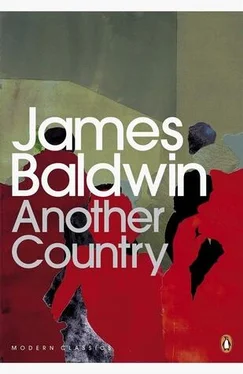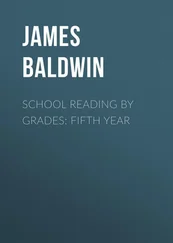They sat down. “She does not really mean any harm,” Yves said. “She thought that she was speaking for my good.”
“She thinks it’s good for you to distrust me — just when I’m about to get on a boat? Doesn’t she think we have enough to worry about?”
“Oh, well. People do not take the relations between boys seriously, you know that. We will never know many people who believe we love each other. They do not believe there can be tears between men. They think we are only playing a game and that we do it to shock them.”
Eric was silent, chewing on the raw vegetables which seemed to have no taste. He took a swallow of wine, but it did not help. His belly tightened and his forehead began to be damp. “I know. And it’s going to be worse in New York.”
“Oh, well,” said Yves, with an odd and moving note of finality in his voice, “as long as you do not abandon me, I will not be afraid.”
Eric smiled — at the tone, at the statement; but he felt his forehead flush hotter, and a strange fear closed his throat. “Is that a promise?” he asked. He asked it lightly, but his voice sounded stifled; and Yves, who had lowered his head to his plate, looked up. They watched each other. Eric stared into Yves’ dark eyes, terribly aware of Yves’ forehead, which gleamed like a skull; and, at the same time, with the most immense desire, he watched Yves’ curving, parted lips. His teeth gleamed. Eric had felt those teeth on his tongue and on his cheek, and those lips had made him moan and tremble many times. And the short length of the table seemed to tremble between them.
“Why don’t we pay Madame Belet now?” Eric asked, “and let her go home?”
Yves rose and walked into the kitchen. Eric munched again on the raw, garlic-flavored vegetables, thinking, This is our last night here. Our last night . Again, he heard their voices in the kitchen, Madame Belet seeming to protest, then agreeing to come in the morning. He finished the last of his wine. Then the kitchen door closed and Yves returned.
“I think, perhaps, she is a little angry,” Yves said, smiling, “but she is gone. She will come again in the morning, especially to say good-bye to you. I think that is because she wants to make certain that you know how much she dislikes you.” He did not sit down again, but stood at his end of the table, his hands on his hips. “She says the chicken is ready, we should not let it get cold.” He laughed, and Eric laughed. “I told her it does not matter with chicken, if it is cold or hot, I like it either way.” They both laughed again. Then, abruptly, silence fell between them.
Eric rose and crossed to Yves, and they stood for a moment like two wrestlers, watching each other with a kind of physical calculation, smiling and pale. Yves always seemed, a moment before the act, tentative and tremulous; not like a girl — like a boy: and this strangely innocent waiting, this virile helplessness, always engendered in Eric a positive storm of tenderness. Everything in him, from his heights and depths, his mysterious, hidden source, came rushing together, like a great flood barely channeled in a narrow mountain stream. And it chilled him like that — like icy water; and roared in him like that, and with the menace of things scarcely understood, barely to be controlled; and he shook with the violence with which he flowed toward Yves. It was this violence which made him gentle, for it frightened him. And now he touched Yves lightly and wonderingly on the cheek. Yves’ smile faded, he watched Eric, they moved into each other’s arms.
There were the wine bottle and the glasses on the table, their plates, the platter, the bread; Yves had left a cigarette burning in an ashtray on the table, it was nearly nothing but ash now, long and gray; and the kitchen light was on. “You say you don’t care about the chicken?” Eric whispered, laughing. Yves laughed, giving off a whiff of garlic, of peppery sweat. Their arms locked around each other, then they drew apart, and, holding hands, stumbled into the bedroom, into the great haven of their bed. Perhaps it had never before seemed so much like a haven, so much their own, now that the terrible floodwaters of time were about to overtake it. And perhaps they had never before so belonged to each other, had never before given or taken so much from each other, as they did now, burning and sobbing on the crying bed.
They labored together slowly, violently, a long time: both feared the end. Both feared the morning, when the moon and stars would be gone, when this room would be harsh and sorrowful with sunlight, and this bed would be dismantled, waiting for other flesh. Love is expensive, Yves had once said, with his curiously dry wonder. One must put furniture around it, or it goes. Now, for a while, there would be no furniture — how long would this night have to last them? What would the morning bring? the imminent morning, behind which were hidden so many mornings, so many nights.
And they moaned. Soon, Yves whispered, sounding insistent, like a child, and with a terrible regret. Soon. Eric’s hands and mouth opened and closed on his lover’s body, their bodies strained yet closer together, and Yves’ body shook and he called Eric’s name as no one had ever called this name before. Eric. Eric. Eric. The sound of his breath filled Eric, heavier than the far-off pounding of the sea.
Then they were silent, breathing hard. The sound of the sea returned. They were aware of the light in the living room, the light left burning in the kitchen. But they did not move. They remained still in one another’s arms, in their slowly chilling bed. Soon, one of them, it would he Yves, would move, would light two cigarettes. They would lie in bed, smoking, talking and giggling. Then they would shower: what a mess we are! Yves would cry, laughing a laugh of triumph. Then they would dress, they would probably eat, they would probably go out. And soon the night would end. But, for the moment, they were simply exhausted and at peace with one another and loath to leave the only haven either of them had ever found.
And, in fact, they did not move again that night, smoked no cigarettes, ate no chicken, did no talking, drank no champagne. They fell asleep as they were, cradled, spoon-fashion, against each other, lulled by the pounding of the sea. Eric woke once, when the kitten crawled into bed, trying to place itself around Yves’ neck. But he forced it to the foot of the bed. He turned around, leaning on one elbow, watching Yves’ sleeping face. He thought of getting up and turning off all the lights; he felt a little hungry. But nothing seemed important enough to take him out of bed, to take him away from Yves, even for a moment. He lay down again, closing his eyes, and listening to Yves’ breathing. He fell asleep, thinking, Life is very different in New York, and he woke up with this thought, just as the sun was beginning to rise. Yves was awake and was watching him. Eric thought, Maybe he’ll hate New York. And then, maybe he’ll hate me, too. Yves looked frightened and determined. They were silent. Yves suddenly pulled Eric into his arms as though he were angry, or as though he were lost. By and by they were at peace again, and then they lay there in silence, blue cigarette smoke circling around them in the sunny air, the kitten purring in the sunlight at their feet. Then the sound of Madame Belet in the kitchen told Eric it was time to make tracks.
Eight days later, Eric was in New York, with Yves’ last words still ringing in his ears, and his touch and his smell all over his body. And Yves’ eyes, like the searchlight of the Eiffel Tower or the sweep of a lighthouse light, lit up, at intervals, the grave darkness around him and afforded him, in the black distance, his only frame of reference and his only means of navigation.
Читать дальше












